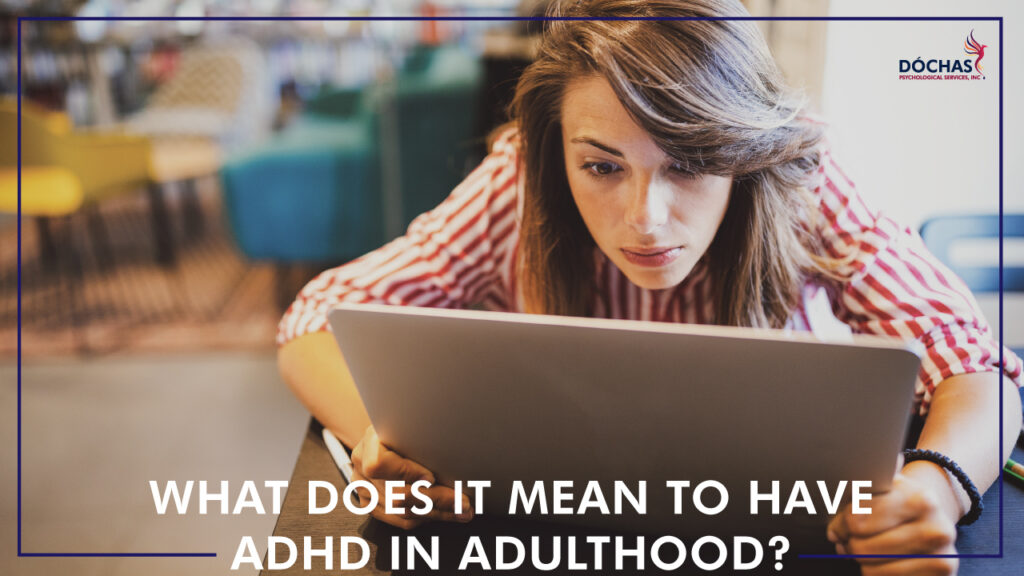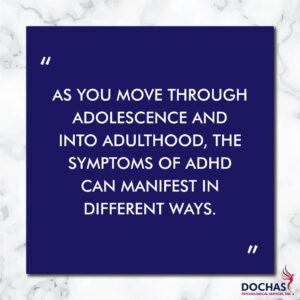Hello, it’s Rachael again! Last week I dove into what is ADHD, and so I want to follow up this week with what it means to have ADHD in adulthood. ADHD is often diagnosed in childhood and treated with psychopharmacology and a variety of psychotherapies. These early interventions will often allow someone with ADHD to transition into adulthood with little difficulty. However, not everyone transitions easily and not everyone gets diagnosed in childhood.
What Do Symptoms Look Like in Adults?
As you move through adolescence and into adulthood, the symptoms of ADHD can manifest in different ways. Hyperactivity in a child with ADHD often includes more motor activities such as running around or climbing, but adult hyperactivity may display itself as feeling extremely restless, fidgeting, and being engaged in constant activity. The inattention symptoms are often displayed as forgetfulness, poor organizational skills, constantly starting a new task before finishing another, and lack of attention to detail. The impulsivity in adults can result in risk-taking activities such as driving dangerously.
The changes and differences in the symptoms can make the diagnosis of ADHD in adults very difficult. How the symptoms are displayed, and what characteristics of ADHD a person has, differs from person to person and from situation to situation for each person. Someone who experiences high inattention at work may experience low inattention paired with high hyperactivity and impulsivity in social situations.
The Impact of the Transition Into Adulthood
Prior to transitioning into adulthood, an individual with ADHD may have been able to function without significant impairment but the new demands may result in the symptoms of ADHD being more noticeable, causing impairment in the social, relationship, and scholastic/occupational areas of life. The increase in independence, change of routine, and stress of adulthood is often why adults who were not previously diagnosed with ADHD get diagnosed or those previously diagnosed with ADHD begin to experience difficulties again.
An adult with ADHD can struggle in a variety of different areas of their life, depending on which symptoms are most prevalent in the situation. They may have difficulty maintaining their home or keeping up on work and school tasks due to inattention causing them to forget or having difficulty staying focused. They may struggle in maintaining relationships due to impulsive decision making, inattention making their partner feel neglected, or their constant need to be on the go becoming too much for another person.
When Is It ADHD?
While many of us may relate to some of the symptoms of ADHD from time to time or in different situations, if you have ADHD you will experience these symptoms frequently, across a wide range of situations, and will often experience distress and impairment in multiple areas of life. This impairment is often seen in simple daily tasks, like putting your keys on the hook or doing housework, which for someone with ADHD can seem as difficult as more complicated tasks (like managing your time, writing a test, or scheduling appointments).
When symptoms have such a noticeable impact on your life, it can be helpful to go through your treatment options with a professional. This is not limited to medications—there are also behavioural strategies that can help, and a knowledgeable professional can guide you through all your options. Recognizing the impact of ADHD on your day-to-day life, and noticing the patterns that might be interfering with where you would like to be, can be a first step in living well with ADHD. You can also find support from others who are living with ADHD.

Need some professional help as you navigate what it means to have ADHD as an adult? One of us on the team at Dóchas would love to provide a helping hand. Reach out to us at 780 446 0300 or by email at info@dochaspsych.com.
Resources:
- This website also has a lot of information for adults diagnosed with ADHD: Children and Adults with Attention Deficit Hyperactive Disorder (CHADD) https://chadd.org/
Other resources on the blog about ADHD:
About Dóchas Psychological
Dóchas Psychological Services is a well-established and trusted therapy clinic located in Spruce Grove, Alberta. At Dóchas we value the idea that everyone deserves a safe space. Through connection and education, our team works hard to build a trustworthy relationship with each of our clients. It is our goal to create a community for our clients to feel like they belong.
Disclaimer
Information provided through Dóchas Psychological Services blogs or vlogs is meant for educational purposes only. They are NOT medical or mental health advice. You can read more about our disclaimer here.


